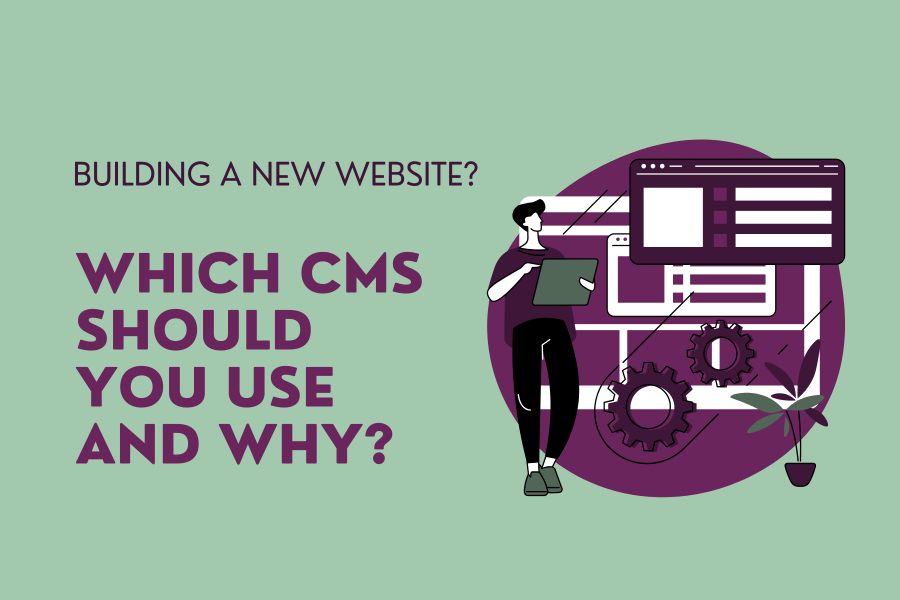Building a New Website? Which CMS Should You Use and Why?
If you are launching or updating a website, you have many questions to answer. What should my site say? Who is my audience? What colors do I want to use? What do I want website visitors to do?
However, one of the most important questions will be: Which CMS should I use?
Before you build or update a website, you need to choose the content management system platform best suited for your unique goals, strategy, and processes. Here are a few things to help you decide which CMS is right for you.
What’s a CMS?
A CMS, or content management system, is a platform for creating, managing, and modifying content on a website. At one time, websites were built entirely through lines of code. Now, websites are primarily built using CMS systems with drag-and-drop or WYSIWYG (what you see is what you get) editors that allow you to edit and add content with just a few clicks.
From WordPress and Shopify to Squarespace and Wix, there are countless options for CMS systems. So, how do you know which one is right for you?
Related: 5 Signs You Need to Consider a Website Redesign
How To Decide Which CMS Is Right For You
The large market of CMS systems can be a pro and a con. You have plenty of options to choose from, but the number of options can also feel overwhelming. As you consider which CMS might be right for you, keep these top factors in mind to help you find the platform best for your needs, audience, and goals.
UI/UX: Does the user experience meet my standards?
Each CMS system has a distinct design and style for user interface (UI) and user experience (UX). UI and UX impact how website visitors experience the front-end of a site and how your team experiences the back-end of the website when making changes. View sample websites to see the user experience from the front-end, and try a free demo or test account to view the user interface on the back-end.
How does the site feel? Does user experience align with your expectations? Are there enough customization opportunities to make it function and look how I’d like?
Related: The Latest Google Updates: What You Need To Show In Search
User-Friendliness: Can my team work in the CMS?
How the site looks is just as important as how it works. You need a website that will be easy for both your customers and your team to use. As you explore the back-end of a potential CMS, consider how easy or complicated it is to work in.
Will your team be able to update it on their own? Will you need a developer or outside vendor to help? What training will be needed to teach your team how to use it?
Customization: How customizable is the website design?
Each CMS offers different levels of design customization. Some CMS systems are highly customizable and can bring your brand guide to life with unique layouts, typography, and styling. Others, typically more defined site builders, are more limited in what you can change. Find a platform that offers enough flexibility to match all of your unique branding.
Does the CMS allow you to customize fonts, colors, imagery, and styles?
Sales/CRM Integration: Does it work with my sales systems?
Your website isn’t there only to be visually impressive. It is there to act as a marketing and sales tool, arguably your primary marketing destination. Make sure it can do its job. Consider how the CMS integrates into your existing marketing tech stack and customer relationship management (CRM) system.
Can it collect leads and send them to your CRM? What other features does it offer for identifying customers and collecting data about their behavior?
Freshness: Is the CMS easy to update?
Every website will need to be updated. We encourage our clients to consider a website refresh or update every two to three years. Consider this when choosing your CMS. Look for a system that lets you make meaningful updates without starting from scratch.
Can you easily add new pages? How difficult is it to introduce new styles, fonts, and themes?
Related: The 8 Critical Dos and Don’ts of Website Maintenance
Our Top Four CMS Systems
While there are many options when choosing a CMS, we have a few favorites. Here are our top four picks we recommend to our clients.
WordPress with Elementor: WordPress is one of the most powerful and flexible CMS platforms. It offers thousands of plugins, themes, and customization options. When paired with Elementor, a drag-and-drop website builder, it makes it easier for non-developers to create and manage pages. Unlike many other CMS systems, you don’t pay a monthly fee to use WordPress, though there is an annual fee for the Elementor page builder. You install it on hosting platforms, also a separate fee, and keep full control of your website assets. The only con we can see with WordPress is the endless third-party developer plug-ins and page builders to choose from. The risk becomes staying up to date with new releases of everything keeping your site running optimal. We do this in an automated way and with the credibility of Elemntor lowering the risk of them dropping the ball.
Squarespace: Squarespace makes it easy to build a stylish, professional-looking site without getting too technical. Its all-in-one platform offers professional templates, built-in e-commerce, and intuitive editing tools. It’s a good option for small teams or solo business owners who want something simple and polished right out of the box. And, the foundational sites are all Squarespace-built without third parties.
Webflow: Similar to Squarespace, Webflow offers stylish templates and drag-and-drop tools to make it easy to build a clean, professional website. Unlike Squarespace, Webflow offers more customization options and custom coding, making it a more flexible option for teams with designers and developers who want more control. These reasons make Webflow most often a designer’s favorite.
HubSpot CMS: HubSpot is known for its CRM features, but it also serves as a CMS, allowing users to create landing pages and full websites. Because it directly integrates with HubSpot’s CRM, the CMS makes it easy to track leads, personalize content, and optimize conversions. It’s a good option for brands leaning heavily into inbound marketing and using the HubSpot CMS at a high level. This CMS keeps getting better and better and we remain a fan of all things HubSpot.
Related: How Much Does a Website Cost?
Find the Perfect CMS for Your Website Refresh
Even the most beautiful, finely crafted websites need to evolve over time. Updates are a part of maintaining a professional website that continues to appear in search, engage customers, and drive leads and conversions.
Whether you are starting from scratch or building a new framework for an existing site, start with a CMS foundation aligned with your vision, capabilities, and future goals.
Need help deciding which CMS is right for you? Talk to the team of professional marketing and website strategists at SpotOn Digital Media. We’ll help you make the right decision and bring your new site to life through our website design and optimization services.
Build a website that can help you reach your goals. Contact us today.

